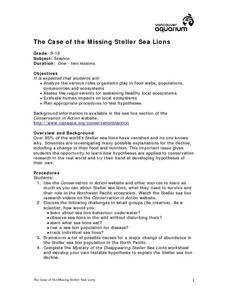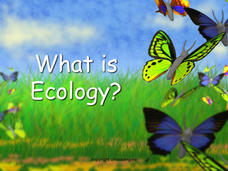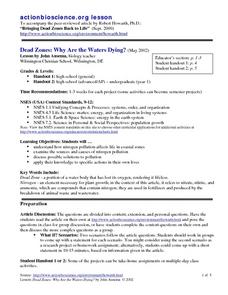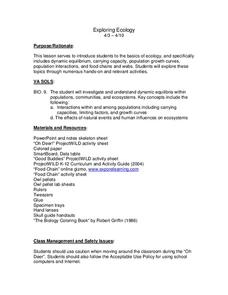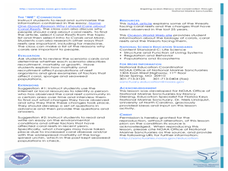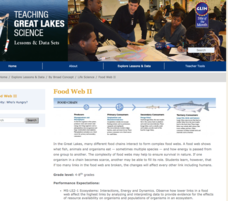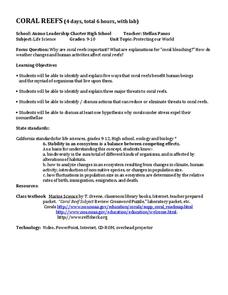Curated OER
The MPA “GamePlan”
Eighth graders explore the purpose of having Marine Protected Areas. In this environmental science lesson, 8th graders simulate the planning process by playing a board game. They explain the positive and negative effects of trade offs.
Curated OER
Invasion of the (Cactus) Booty Snatchers
Students, in groups of four,identify and analyze relationships among birds within a population, a community and an urban ecosystem. They fill out, while they're completing their experiments, a Populations of Birds Student Data Sheet.
Curated OER
The Case of the Missing Steller Sea Lions
Students identify and analyze the various roles organisms play in food webs, populations, communities and ecosystems. Students assess the requirements for sustaining healthy local ecosystems. STudents evaluate human impacts on local...
Curated OER
the Wonder of Wetlands
Students explore the importance of the wetland ecosystem, its properties and functions, as well as, the many birds, animals, and plant life found there.
Serendip
Food Webs, Energy Flow, Carbon Cycle, and Trophic Pyramids
The reintroduction of a species to an area doesn't always go as expected. Scholars learn about the reintroduction of wolves into Yellowstone National Park with a video, reading, and discussion questions. They complete a hands-on activity...
American Museum of Natural History
Saving Species
Some scientists dedicate their lives to researching and protecting endangered species. An online lesson teaches about three scientists around the world who do just that. They learn about spiders, mollusks, and reptiles from North...
Curated OER
Bird Airport Control
Students visit a local wetland and record observations of waterfowl on downloadable worksheets. They compile class data and list similarities and differences among species of birds observed.
Biology Junction
What Is Ecology?
Do you know the name for the biological study of interactions? A short presentation with accompanying worksheet introduces individuals to ecology. The materials offer a broad overview of the subject and the levels of organization to...
Curated OER
Dead Zones: Why Are the Waters Dying?
Students investigate the effects of pollution on marine ecosystems. They read and discuss an article, identify the effects of pollution on marine life, conduct research on local nutrient pollution, and conduct local water quality studies.
Curated OER
Why Care About Amphibian Population Decline and Malformations?
Students examine the reasons for preserving wildlife. They look at reasons for amphibian malformations and write an essay about the ethical issues that this brings up. They listen to the teacher read quotes about extinction and how the...
Curated OER
Exploring Ecology
Students explore the basics of ecology through numerous hands-on and relevant activities. They participate in an online food chain demonstration, which explores food web dynamics. They dissect owl pellets, examine the prey's bones, and...
Curated OER
Benthic Macroinvertebrates
Students survey and describe a stream ecosystem. They sample the benthic macroinvertebrate populations of a given stream and determine community structure through the use of the Chandler Index and a species diversity index.
Curated OER
Precious Water: Is it a Need, a Right, or a Commodity?
Pupils determine whether water is a need, a right, or a commodity. For this water lesson, students investigate land and water ecosystems through activities. Pupils also discover water as a resource and energy source as they observe and...
Curated OER
Lotic Environment Lesson Plans
Young scholars create and conduct experiments on a "classroom river habitat." They manipulate the biotic and abiotic factors so that they are able to compare an artificially prepared river model to a naturally occurring lotic ecosystem.
Curated OER
Lotic Environment
Students assemble a classroom river model as an example of a lotic system. They control and measure biotic and abiotic information for the in-class system and compare data with a lotic system in a natural environment.
Curated OER
Forest Management
Students analyze physical and biological changes in the Sequoia forest ecosystem, especially logging and fire management practices. They evaluate the controversy of how logging and fire management should be conducted in the Giant Sequoia...
Curated OER
If You Mess With A Wetland, At Least Try to Make Amends!
Eighth graders examine the role of wetlands in an ecosystem. In groups, they use the internet to research how humans have disturbed and ruined the effectiveness of wetlands throughout the country. They pretend they are in charge of...
Michigan Sea Grant
Invasive Species
Learners identify invasive species to the Great Lakes and analyze their impact on the ecosystem. Using photo cards with pictures and facts, young scientists work in small groups to match invasive species with their corresponding...
Curated OER
The Changing Coral Reef
Students record changes in the composition of a coral reef. In this Coral Reef lesson, students recognize the needs of Coral Reef species to survive. Students chart changes in population over time. Students write an essay...
Michigan Sea Grant
Sea Lamprey
Learners discuss the types of technology that are used to control the population of sea lamprey in the Great Lakes. They explain the parasite/host relationship and understand the devastating impact invasive species have on ecosystems....
Curated OER
Ecology
In this ecology worksheet, students read information about ecology and the nine ecology subdivisions and answer comprehension questions. Students answer ten questions in this matching and fill in the blank worksheet.
Michigan Sea Grant
Food Web II
A food web consists of complex food chains and the more complex the web, the better likelihood of survival. Learners compare and contrast food webs and food chains and discuss concepts like the predator-prey and consumer-producer...
Curated OER
Coral Reefs
Students research coral reefs and identify their benefits to humans, threats to the reef, how to reduce and eliminate threats, and more. In this coral reef lesson plan, students research the reefs, and take a field trip to an aquarium.
Curated OER
Eutrophication Experiments
Observe two different water samples and write down observations. Write a paragraph which predicts the relative amounts of nutrients, nitrates, and phosphates in the water samples. Compare water samples under a microscope.




